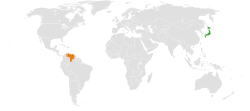Top Qs
Timeline
Chat
Perspective
Japan–Venezuela relations
Bilateral relations From Wikipedia, the free encyclopedia
Remove ads
Japan–Venezuela relations are bilateral relations between Japan and Venezuela. Formal diplomatic relations between the countries were established in August 1938.[1] Venezuela broke off diplomatic ties with Japan (and the other Axis Powers) in December 1941, shortly after the Japanese attack on Pearl Harbor.[2]

Japanese banks Marubeni and Mitsui loaned Venezuela $3.5 billion in 2007 to be repaid in oil. The Japan Bank for International Cooperation provided $1.89 billion in loans to support the banks.
Japan imported US$1 bn worth of goods from Venezuela in 2008, mainly aluminium, iron ore and cacao.[3]
On 23 December 2009, Chavez threatened to expropriate Toyota Motor Corp.'s local assembly plant.[4]
In February 2019, Japan recognized Venezuelan opposition leader Juan Guaidó as Venezuelan president, cutting off relations with the disputed government of left-wing Nicolás Maduro, the successor of late Hugo Chavez.[5]
Remove ads
High-level visits
In 1999, Venezuelan President Hugo Chavez made a three-day trip to Japan.
Hugo Chavez made another two-day trip in 2009, during which he met Prime Minister Taro Aso. During the trip they agreed to cooperate on oil and gas developments and form a committee to study financing development and exploration. Japan and Venezuela signed a dozen other accords as part of Chavez's visit.[6]
See also
References
Sources
External links
Wikiwand - on
Seamless Wikipedia browsing. On steroids.
Remove ads

